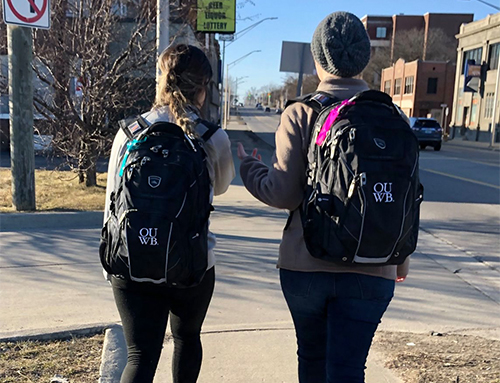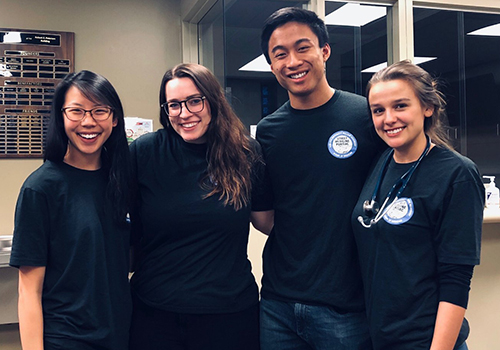
Oakland University William Beaumont School of Medicine’s student-led Street Medicine program has been awarded a $57,000 grant — money that will go a long way in helping the community, say those involved.
The grant was awarded to the OUWB Street Medicine program from the DMC Foundation, which is affiliated with the Community Foundation of Southeast Michigan.
OUWB’s Street Medicine program launched less than a year ago, and is a first-of-its-kind program in Oakland County.
The program already has made a big difference in the community by helping Pontiac’s homeless population in myriad ways — from assisting people struggling with drug and alcohol addiction to helping the vulnerable population manage their respective ways through one of the worst global pandemics in history.
“The greatest part of getting the grant is that someone saw what our program was doing already and thought ‘They’re doing something good in the community and we want to invest in this,’” said Tory Drzyzga, a fourth-year medical student at OUWB and Street Medicine co-founder.
“I never could have even imagined that we would receive so much support,” said Lexie Ranski, a fourth-year medical student at OUWB and Street Medicine co-founder.
“We are so fortunate that we have received the support that we have from the school and from the hospital. This grant just goes to show how supportive the community is of our work and I just think that’s incredible.”
‘I couldn’t believe that happened’
Generally speaking, street medicine is a collaboration of health and social services that address the unique needs and circumstances of the unsheltered homeless. Today, programs exist in more than 85 cities and 15 countries across five continents.
Ranski and Drzyzga were first exposed to street medicine as undergrads at Wayne State University. That program focuses on people who are homeless in Detroit.
The duo saw an opportunity to start a program in Pontiac almost as soon as they began attending OUWB in 2017.
OUWB’s Street Medicine program kicked off last November with support from organizations such as the Oakland County Homeless Healthcare Collaboration, Gary Burnstein Community Clinic, and Projects for Assistance in Transition from Homelessness (PATH). The program also secured a small grant from Compass, OUWB’s address for community engagement.
The current leadership of OUWB's Street Medicine team. From left to right, Kaitlin Pataroque, Tory Drzyzga, Nick Ang, and Lexie Ranski. |
It initially stuck to the Hope Hospitality & Warming Center in Pontiac as a way of introducing the program and students to the homeless community.
Within the shelter there were three teams of two students. Each team also had a physician. Teams provided acute medical care, helping people with blood pressure and heart rate checks, back pain, rashes, etc.
According to Drzyzga and Ranski, it didn’t take too long for the people who use the center to grow more comfortable in working with the OUWB students.
In just one example, team members were able to help a man in his 30s who had suffered for years as a result of alcoholism. Ranski said the team didn’t think he would be open to talking about treatment for alcoholism right away, so they just focused on acute needs related to the disease, such as hypertension.
“As we got to know him better and talk to him more, he opened up and we came to find that he actually really wanted to quit drinking and reconnect with his family,” she said.
The Street Medicine team helped him work through issues such as anxiety to develop coping skills. The team, which also includes physicians, went so far as to help him secure a prescription for a medication that helps people who have withdrawal symptoms when they stop drinking, including transporting him to the pharmacy and paying for the medication.
“After that, we didn’t see him for a month and wondered what happened,” said Ranski. “Then, we ran into some of his friends from the shelter and they said ‘We wanted to let you know that (the patient) has actually checked into rehab and has been sober now for a month.’”
“That was an incredible success story,” she said. “I couldn’t believe that happened.”
Next steps
In early 2020, the OUWB Street Medicine team had just started venturing away from the center to provide services via “street runs.”
Street runs include partnering with Baldwin Center to deliver bagged lunches. That opens the door, Drzyzga said, to asking people who are homeless about any health issues they may be having.
The program was starting to hit its stride before the COVID-19 pandemic hit.
“We felt it was really important to keep going because these people have a lot of anxiety about COVID-19, just like everybody else,” said Ranski. “It was really important to be there and offer some reassurance to them.
“And just because there’s a pandemic doesn’t meant that other medical problems people are dealing with go away…they still have hypertension, diabetes, joint pain, or whatever else the case may be,” she added.
With their masks on, the smaller scale Street Medicine team set out to continue helping the community. Not only did they resume the normal program offerings, but they incorporated COVID-19 screenings and education.
The team plans to soon start taking more OUWB medical student volunteers.
Future of the program
Jason Wasserman, Ph.D., associate professor, Department of Foundational Medical Studies and Department of Pediatrics, OUWB, serves as advisor to the program.
He said OUWB Street Medicine has been a “relatively successful” program and the DMC Foundation grant “will be able to amplify the program’s impact.”
“The money is going to be used for all kinds of innovative initiatives,” he said.
Two of the most exciting, he said, are special telemedicine backpacks that allow for instant connection to volunteer physicians via laptop, and a chemistry kit that will allow for team members to do instant blood tests that could ultimately prove life-saving.
Drzyzga said funds will also be used for ongoing operational costs (over-the-counter medications, compression socks, etc.) as well as otoscopes and ophthalmoscopes, reflective vests, a portable ultrasound, a defibrillator, and more.
“It’s kind of incredible to think about how much money we actually have,” said Drzyzga.
As fourth-year medical students set to graduate in 2021, Drzyzga and Ranski said they are preparing to pass the torch on the program they’ve been so passionate about to the next crop of leaders (currently second-year students). Ranski said in November, two more first-year students will be recruited to join the leadership team and train to lead the program. The process will be set in place annually so that the program will continue indefinitely.
“Everyone will be very prepared to take over and help Street Medicine become the best it can be,” she said.
For more information, contact Andrew Dietderich, marketing writer, OUWB, at [email protected].
Follow OUWB on Facebook, Twitter, and Instagram.
NOTICE: Except where otherwise noted, all articles are published under a Creative Commons Attribution 3.0 license. You are free to copy, distribute, adapt, transmit, or make commercial use of this work as long as you attribute Oakland University William Beaumont School of Medicine as the original creator and include a link to this article.


